| Listing 1 - 10 of 15 | << page >> |
Sort by
|
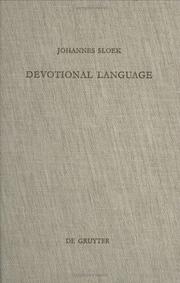
ISBN: 3110152282 311081028X 9783110810288 9783110152289 Year: 2015 Volume: 77 Publisher: Berlin Boston
Abstract | Keywords | Export | Availability | Bookmark
 Loading...
Loading...Choose an application
- Reference Manager
- EndNote
- RefWorks (Direct export to RefWorks)
Language and languages --- Religious aspects --- Christianity --- Philosophy --- 248.159 --- Devoties:--algemeen --- 248.159 Devoties:--algemeen --- Religion --- Philosophy & Religion --- Foreign languages --- Languages --- Anthropology --- Communication --- Ethnology --- Information theory --- Meaning (Psychology) --- Philology --- Linguistics --- Religious aspects&delete& --- Christianity. --- Philosophy. --- Christianity and language --- Language and languages - Religious aspects - Christianity --- Language and languages - Philosophy
Book
ISBN: 9789004349872 9004349871 9789004276659 9004276653 Year: 2017 Volume: 142 Publisher: Brill
Abstract | Keywords | Export | Availability | Bookmark
 Loading...
Loading...Choose an application
- Reference Manager
- EndNote
- RefWorks (Direct export to RefWorks)
In Ideas on Language in Early Latin Christianity , Tim Denecker investigates, in a comprehensive and systematic way, the views held on the history, diversity and properties of language(s) by Christian Latin authors from Tertullian (b. c.160) to Isidore of Seville (d. 636). This historical period witnessed various sociocultural changes, affecting linguistic situations and the ways in which these were perceived. Christian intellectuals were confronted with languages other than Latin in the context of the propagation of faith, and in reflecting on language were bound to comply with the relevant biblical accounts. Whereas previous research has mostly focused on the (indeed vital) contribution of Augustine, the present study reveals the diversified and dynamic nature of linguistic reflection in early Latin Christianity.
Language and languages --- Christian literature, Early --- Latin literature --- Religious aspects --- Christianity. --- History and criticism. --- 807.31 --- 807.31 Christelijk Latijn. Kerklatijn --- Christelijk Latijn. Kerklatijn --- Language and languages - Religious aspects - Christianity. --- Christian literature, Early - History and criticism. --- Latin literature - History and criticism. --- Christianity and language
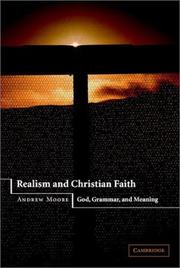
ISBN: 1107132541 1280418516 113914782X 0511180454 051106439X 0511058063 0511615493 0511307365 0511072856 9780511064395 9780511615498 9781280418518 9780511058066 9780511072857 9780521811095 0521811090 0521524156 9780521524155 9781107132542 9780511180453 9780511307362 Year: 2003 Publisher: Cambridge, UK New York Cambridge University Press
Abstract | Keywords | Export | Availability | Bookmark
 Loading...
Loading...Choose an application
- Reference Manager
- EndNote
- RefWorks (Direct export to RefWorks)
The question of realism - that is, whether God exists independently of human beings - is central to much contemporary theology and church life. It is also an important topic in the philosophy of religion. This book discusses the relationship between realism and Christian faith in a thorough and systematic way and uses the resources of both philosophy and theology to argue for a Christocentric narrative realism. Many previous defences of realism have attempted to model Christian belief on scientific theory but Moore argues that this comparison is misleading and inadequate on both theological and philosophical grounds. In dialogue with speech act theory and critiques of realism by both non-realists and Wittgensteinians, a new account of the meaningfulness of Christian language is proposed. Moore uses this to develop a regulative conception of realism according to which God's independent reality is shown principally in Christ and then through Christian practices and the lives of Christians.
God --- Language and languages --- Christianity and language --- Ontological argument --- Ontology --- Proof, Ontological. --- Religious aspects --- Christianity. --- Foreign languages --- Languages --- Anthropology --- Communication --- Ethnology --- Information theory --- Meaning (Psychology) --- Philology --- Linguistics --- Proof, Ontological --- Religious aspects&delete& --- Christianity --- Arts and Humanities --- Religion --- God - Proof, Ontological. --- Language and languages - Religious aspects - Christianity.
Book
ISBN: 2204023221 9782204023221 Year: 1985 Volume: 132 Publisher: Paris Cerf
Abstract | Keywords | Export | Availability | Bookmark
 Loading...
Loading...Choose an application
- Reference Manager
- EndNote
- RefWorks (Direct export to RefWorks)
Doctrine of God (christianism) --- God (Christianity) --- Language and languages --- Religious aspects --- Christianity --- 21*015 --- -#GGSB: Godsleer --- #GGSB: Religieuze taal --- Foreign languages --- Languages --- Anthropology --- Communication --- Ethnology --- Information theory --- Meaning (Psychology) --- Philology --- Linguistics --- Theologie en taal --- -Christianity --- God --- Christianity. --- 21*015 Theologie en taal --- God (Christianity). --- #GGSB: Godsleer --- Trinity --- Religious aspects&delete& --- Langage. Théologie. --- Taal. Godgeleerdheid. --- Godsleer --- Religieuze taal --- Christianity and language --- Language and languages - Religious aspects - Christianity
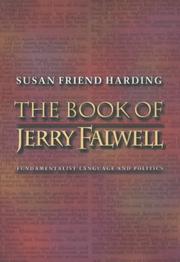
ISBN: 0691089582 0691059896 9780691059891 9780691089584 Year: 2001 Publisher: Princeton, N.J. Princeton University Press
Abstract | Keywords | Export | Availability | Bookmark
 Loading...
Loading...Choose an application
- Reference Manager
- EndNote
- RefWorks (Direct export to RefWorks)
"Susan Harding, a cultural anthropologist, set out in the 1980s to understand the significance of Christian fundamentalism to date. Falwell and his co-pastors were the pivotal figures in the movement. It is on them that Harding focuses, and, in particular, their use of the Bible's language. She argues that this language is the medium through which born-again Christians, individual and collective, come to understand themselves as Christians. And it is inside this language that much of the born-again movement took place. Preachers like Falwell command a Bible-based poetics of great complexity, variety, creativity, and force, and, with it, attempt to mold their churches into living testaments of the Bible. Harding focuses on the words - sermons, speeches, books, audiotapes, and television broadcasts - of individual preachers, particularly Falwell, as they rewrote their Bible-based tradition to include, rather than exclude, intense worldly engagement. As a result of these efforts, born-again Christians recast themselves as a people not separated from but engaged in making history."--Jacket.
Fundamentalism. --- Language and languages --- Religious aspects --- Christianity. --- #SBIB:39A10 --- #SBIB:39A74 --- #SBIB:316.331H594 --- Christianity and language --- Christian fundamentalism --- Protestant fundamentalism --- Religious fundamentalism (Protestantism) --- Protestantism --- Theology, Doctrinal --- Evangelicalism --- Millennialism --- Modernist-fundamentalist controversy --- Antropologie: religie, riten, magie, hekserij --- Etnografie: Amerika --- Godsdienstige bewegingen: informele groepen --- History --- Falwell, Jerry --- Language. --- Oratory. --- Fundamentalism --- Foreign languages --- Languages --- Anthropology --- Communication --- Ethnology --- Information theory --- Meaning (Psychology) --- Philology --- Linguistics --- Religious aspects&delete& --- Christianity --- Language --- Oratory --- Language and languages - Religious aspects - Christianity. --- fundamentalism --- language and religion --- christianity --- politics --- born-again Christianity
Book
ISBN: 9782600014908 260001490X Year: 2011 Volume: 475 Publisher: Genève : Droz,
Abstract | Keywords | Export | Availability | Bookmark
 Loading...
Loading...Choose an application
- Reference Manager
- EndNote
- RefWorks (Direct export to RefWorks)
Theodor Buchmann, better known as Theodore Bibliander (1505-64), held the chair of Old Testament at the theological school in Zurich as the immediate successor to Huldrych Zwingli. A Hebraist and Orientalist who edited a Latin translation of the Qur'an, Bibliander professed a well-articulated universalist theology based on and around the knowledge of languages in general, and of Oriental languages in particular. In his treatise De ratione omnium linguarum et literarum commentarius (Zurich, 1548), Bibliander sought to promote the contemporary notions of harmonia linguarum and concordia mundi, as well as the study of Hebrew, as an essential means to achieving a universal salvation. The present volume is an annotated translation of this work.
Linguistics --- Language and languages --- Grammar, Comparative and general --- Philosophy --- Early works to 1800 --- Religious aspects --- Christianity --- Linguistique --- Latin (langue) --- Ouvrages avant 1800. --- 873.4 --- 094 "15" --- Humanistisch Latijnse literatuur --- Oude en merkwaardige drukken. Kostbare en zeldzame boeken. Preciosa en rariora--16e eeuw. Periode 1500-1599 --- Linguistic universals --- Origin --- 094 "15" Oude en merkwaardige drukken. Kostbare en zeldzame boeken. Preciosa en rariora--16e eeuw. Periode 1500-1599 --- 873.4 Humanistisch Latijnse literatuur --- 873.4 Humanist Latin literature --- Humanist Latin literature --- Language and languages - Philosophy - Early works to 1800 --- Grammar, Comparative and general - Early works to 1800 --- Language and languages - Religious aspects - Christianity - Early works to 1800
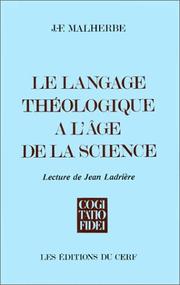
ISBN: 220402273X 9782204022736 Year: 1985 Volume: 129 Publisher: Paris Cerf
Abstract | Keywords | Export | Availability | Bookmark
 Loading...
Loading...Choose an application
- Reference Manager
- EndNote
- RefWorks (Direct export to RefWorks)
Christian fundamental theology --- Philosophy of science --- Languages --- Religion and science --- Langues --- Religion et sciences --- Religious aspects --- Christianity --- History --- Aspect religieux --- Christianisme --- Histoire --- Language and languages --- Ladrière, Jean --- 21*015 --- -Religion and science --- #GBIB:CBMER --- #GGSB: Dogmatiek --- #GGSB: Hermeneutiek (dogmatiek) --- #GGSB: Secularisatie --- #GGSB: Kerk & wereld --- #gsdb3 --- Christianity and science --- Geology --- Geology and religion --- Science --- Science and religion --- Foreign languages --- Anthropology --- Communication --- Ethnology --- Information theory --- Meaning (Psychology) --- Philology --- Linguistics --- Theologie en taal --- -Christianity --- Ladriere, Jean --- Ladrière, J. --- Religion and science. --- Christianity. --- 21*015 Theologie en taal --- Religious aspects&delete& --- Ladrière, Jean. --- Ladrière, Jean, --- Dogmatiek --- Hermeneutiek (dogmatiek) --- Kerk & wereld --- Secularisatie --- Christianity and language --- Language and languages - Religious aspects - Christianity --- Ladrière, Jean, - 1921-2007
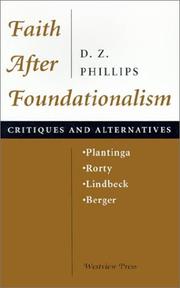
ISBN: 0813326451 9780813326450 Year: 1995 Publisher: Boulder ; San Francisco ; Oxford Westview Press
Abstract | Keywords | Export | Availability | Bookmark
 Loading...
Loading...Choose an application
- Reference Manager
- EndNote
- RefWorks (Direct export to RefWorks)
Connaissance [Théorie de la ] (Religion) --- Connaissance et religion --- Connaissance religieuse [Théorie de la ] --- Epistemologie (Godsdienst) --- Epistémologie (Religion) --- Godsdienst en kennis --- Godsdienstige kennis [Leer van de ] --- Hermeneutics --- Hermeneutiek --- Herméneutique --- Kenleer (Godsdienst) --- Kennis en godsdienst --- Kennisleer (Godsdienst) --- Knowledge [Theory of ] (Religion) --- Religion et connaissance --- Religious knowledge [Theory of ] --- Knowledge, Theory of (Religion) --- Language and languages --- Religious aspects --- Christianity --- 291.1 --- -Foreign languages --- Languages --- Anthropology --- Communication --- Ethnology --- Information theory --- Meaning (Psychology) --- Philology --- Linguistics --- Religious knowledge, Theory of --- Religion --- Theology, Doctrinal --- Interpretation, Methodology of --- Criticism --- Godsdienstfilosofie --- -Christianity --- Philosophy --- -Godsdienstfilosofie --- 291.1 Godsdienstfilosofie --- -Religious knowledge, Theory of --- Foreign languages --- -Epistemology, Religious --- Religious epistemology --- -Interpretation, Methodology of --- Epistemology, Religious --- Language and languages - Religious aspects - Christianity --- -Religious aspects
Multi
ISBN: 3525562446 9783525562444 Year: 1977 Volume: 37 Publisher: Göttingen Vandenhoeck und Ruprecht
Abstract | Keywords | Export | Availability | Bookmark
 Loading...
Loading...Choose an application
- Reference Manager
- EndNote
- RefWorks (Direct export to RefWorks)
Language and languages --- God (Christianity) --- Analysis (Philosophy) --- Religious aspects --- Christianity --- 21*015 --- -#GROL:SEMI-231 --- Foreign languages --- Languages --- Anthropology --- Communication --- Ethnology --- Information theory --- Meaning (Psychology) --- Philology --- Linguistics --- Analysis, Linguistic (Philosophy) --- Analysis, Logical --- Analysis, Philosophical --- Analytic philosophy --- Analytical philosophy --- Linguistic analysis (Philosophy) --- Logical analysis --- Philosophical analysis --- Philosophy, Analytical --- Methodology --- Philosophy --- Logical positivism --- Semantics (Philosophy) --- Theologie en taal --- -Christianity --- God --- God. --- Christianity. --- 21*015 Theologie en taal --- Analysis (Philosophy). --- God (Christianity). --- #GROL:SEMI-231 --- Trinity --- Religious aspects&delete& --- Christianity and language --- Language and languages - Religious aspects - Christianity
Book
ISBN: 9780521279703 9781107010284 9780511845819 0521279704 9781139159487 1139159488 9781139161534 1139161539 9781139157711 113915771X 1283341115 9781283341110 0511845812 1107010284 113915298X 1107228506 1139160532 9786613341112 1139155962 Year: 2011 Publisher: Cambridge Cambridge University Press
Abstract | Keywords | Export | Availability | Bookmark
 Loading...
Loading...Choose an application
- Reference Manager
- EndNote
- RefWorks (Direct export to RefWorks)
One of the central arguments of post-metaphysical theology is that language is inherently 'metaphysical' and consequently that it shoehorns objects into predetermined categories. Because God is beyond such categories, it follows that language cannot apply to God. Drawing on recent work in theology and philosophy of language, Kevin Hector develops an alternative account of language and its relation to God, demonstrating that one need not choose between fitting God into a metaphysical framework, on the one hand, and keeping God at a distance from language, on the other. Hector thus elaborates a 'therapeutic' response to metaphysics: given the extent to which metaphysical presuppositions about language have become embedded in common sense, he argues that metaphysics can be fully overcome only by defending an alternative account of language and its application to God, so as to strip such presuppositions of their apparent self-evidence and release us from their grip.
God (Christianity) --- Philosophical theology --- Language and languages --- Metaphysics --- Religious aspects --- Christianity --- Philosophical theology. --- -Metaphysics. --- 21*015 --- 230*7 --- 21*01 --- God --- Ontology --- Philosophy --- Philosophy of mind --- Foreign languages --- Languages --- Anthropology --- Communication --- Ethnology --- Information theory --- Meaning (Psychology) --- Philology --- Linguistics --- Theology, Philosophical --- Philosophy and religion --- Theology, Doctrinal --- Trinity --- -Christianity --- Theologie en taal --- Recente, hedendaagse theologische discussies --- Godsdienstfilosofie: christelijke religie: filosofisch en rationeel --- 21*01 Godsdienstfilosofie: christelijke religie: filosofisch en rationeel --- 230*7 Recente, hedendaagse theologische discussies --- 21*015 Theologie en taal --- Religious aspects&delete& --- Metaphysics. --- Christianity and language --- Christianity. --- Arts and Humanities --- Religion --- Language and languages - Religious aspects - Christianity
| Listing 1 - 10 of 15 | << page >> |
Sort by
|

 Search
Search Feedback
Feedback About UniCat
About UniCat  Help
Help News
News